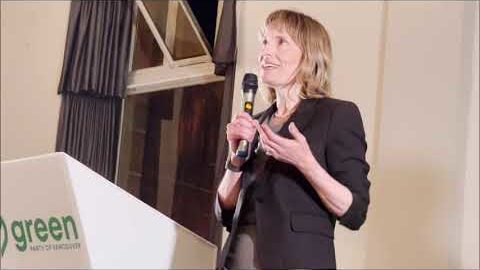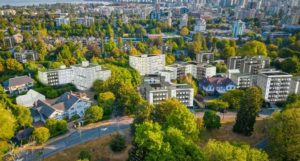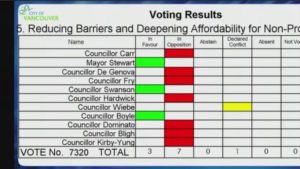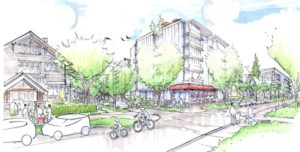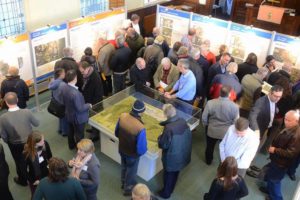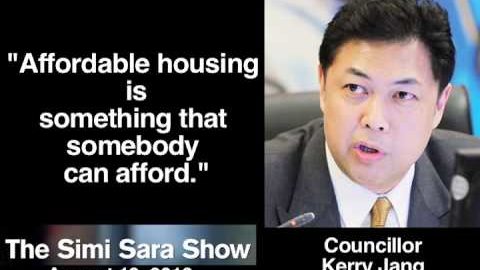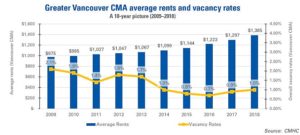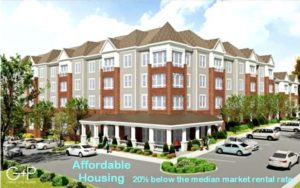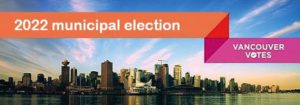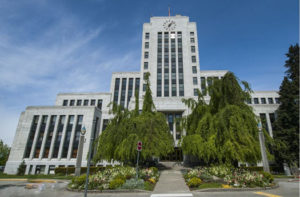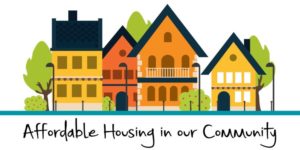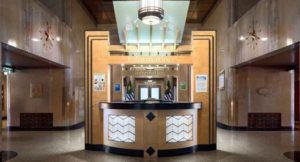
Truth to tell, VanRamblings has some affection for all the folks involved in the Green Party of Vancouver. Deep in our heart we believe that — although we may differ on policy orientation, from time to time — that the Vancouver Greens seeking re-election to Vancouver City Council come the evening of E-Day, Saturday, October 15th — that would be incumbents Pete Fry, Michael Wiebe and Adriane Carr — along with Green Party of Vancouver candidates, Stephanie Smith and Devyani Singh … both of whom we know, like and admire … have the best interests of the citizenry of Vancouver at heart, and as a group are well-meaning and informed folks of conscience who day-in and day-out make decisions — with humility and heart — employing their best judgement on matters placed before them.

On July 9th, at Khatsalano Days in the Kitsilano Vancouver neighbourhood, VanRamblings happened across Vancouver City Councillor Michael Wiebe, who was standing in front of the Green Party of Vancouver booth. Spotting us, smiling that big goofy and welcoming smile of his, he waved us over to speak with him.
Now for a little context: last autumn, VanRamblings wrote that Mr. Wiebe and his Green Party colleague, Pete Fry, constituted two members of the Three Misogynist Musketeers brigade on City Council (Mayor Kennedy Stewart was the third party in the unkind trio), arising from their untoward treatment of their fellow Councillor, Colleen Hardwick, during the course, and outside, of Council meetings.
As well, when respected municipal affairs lawyer Ray Young published a report in September 2020 recommending that Mr. Wiebe resign his seat on Council, arising from a perceived conflict of interest — a report filed at the request of then City Manager, Sadhu Johnston — VanRamblings wrote three withering columns demanding Mr. Wiebe’s immediate resignation of his seat on Council.

With the above in mind, VanRamblings (gingerly) approached Mr. Wiebe. Towering over us (VanRamblings is height-challenged), Mr. Wiebe gave us a fist bump, and told us how glad he was to see us, after which we engaged in — by far — the best, the most expansive, the most detailed, the most informed, and the most humane conversation on Vancouver civic politics we have had with anyone involved in #vanpoli, at any point over the past four years.
Colour us mightily impressed.

Mature of demeanour, Mr. Wiebe — who we’ve known well since his election as a Park Board Commissioner, in 2014 — quietly let us know that these past four years have proved a mighty learning experience for the novice Vancouver City Councillor, which newfound knowledge, over the course of the past 24 months, has translated into a much more settled and thoughtful approach to governance, than previously.
Suffice to say, VanRamblings came away from that day’s discussion with Michael Wiebe with a respect and admiration for him, such that we are giving serious consideration to endorsing his candidacy for re-election to Vancouver City Council.
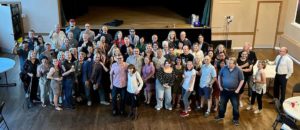
In June, while attending VanRamblings’ good friend (and long, our blog’s much-beloved webmaster) Mike Klassen’s 60th birthday party (Mike is currently an ABC candidate for Vancouver City Council) at the Polish Hall on Fraser Street, we were surprised to see respected and hard-working Green Party of Vancouver City Councillor Pete Fry in attendance. Seems that Mr. Fry & Mr. Klassen have known one another dating back to their days writing for and working on Reverend Moonbeam’s (Darren Atwater’s) much-beloved Terminal City newspaper.
In the 90s, Pete — on this day, with a smile as big as all outdoors crossing his face, his eyes sparkling like the commencement of new day at sunrise, full of promise and intent for good — was, he informed us, the Digiboy of fame and (not quite so much) fortune at Terminal City, and Mike Klassen long a much cherished colleague.
As we expected may have proved to be the case with Mr. Wiebe, there was the possibility, and perhaps not so remote a possibility, that upon spotting us in the Polish Hall, the affable and good-natured (not to mention, incredibly bright and principled) Mr. Fry might have wanted to punch our lights out, given the untoward provocations that he, from time to time, felt had been visited upon him by VanRamblings. Well, here we are today, in one piece, with no bloody nose.

Unpretentious, possessed of good humour, welcoming, friendly, gregarious of nature, articulate (no wonder the media in this town love him), humane and humble, possessed of an uncommon equanimity of presentation and spirit, VanRamblings has long liked, respected and admired Pete Fry — and although Mr. Fry is no particular fan of VanRamblings, either the person or the blog — our affection and respect for Pete Fry has not diminished one iota in all the years we’ve known him. VanRamblings liked Pete in the past & like and admire him through until this day.
As such, as with Mr. Wiebe, VanRamblings would consider endorsing Pete Fry’s re-election to Vancouver City Council, as a thoughtful and considerate candidate possessed of much integrity, who means well for the citizens of Vancouver, always.
The 2022 Green Party of Vancouver campaign launch. Candidate speeches begin at 2:45.
Writing the above about Mr. Wiebe and Mr. Fry, we recognize that it is imcumbent on VanRamblings to set about to formally interview the two Green Party City Councillors — as we arranged last evening at the 2022 Green Party of Vancouver campaign launch — in order to give them voice, to provide each candidate for re-election a forum to have recorded why it is these outstanding Vancouver City Councillors feel they are deserving of your vote, and another term on Council (and, let’s face it, each of these fine candidates very much are worthy of your vote), and what it is they would see themselves accomplishing on a second term on Council.

